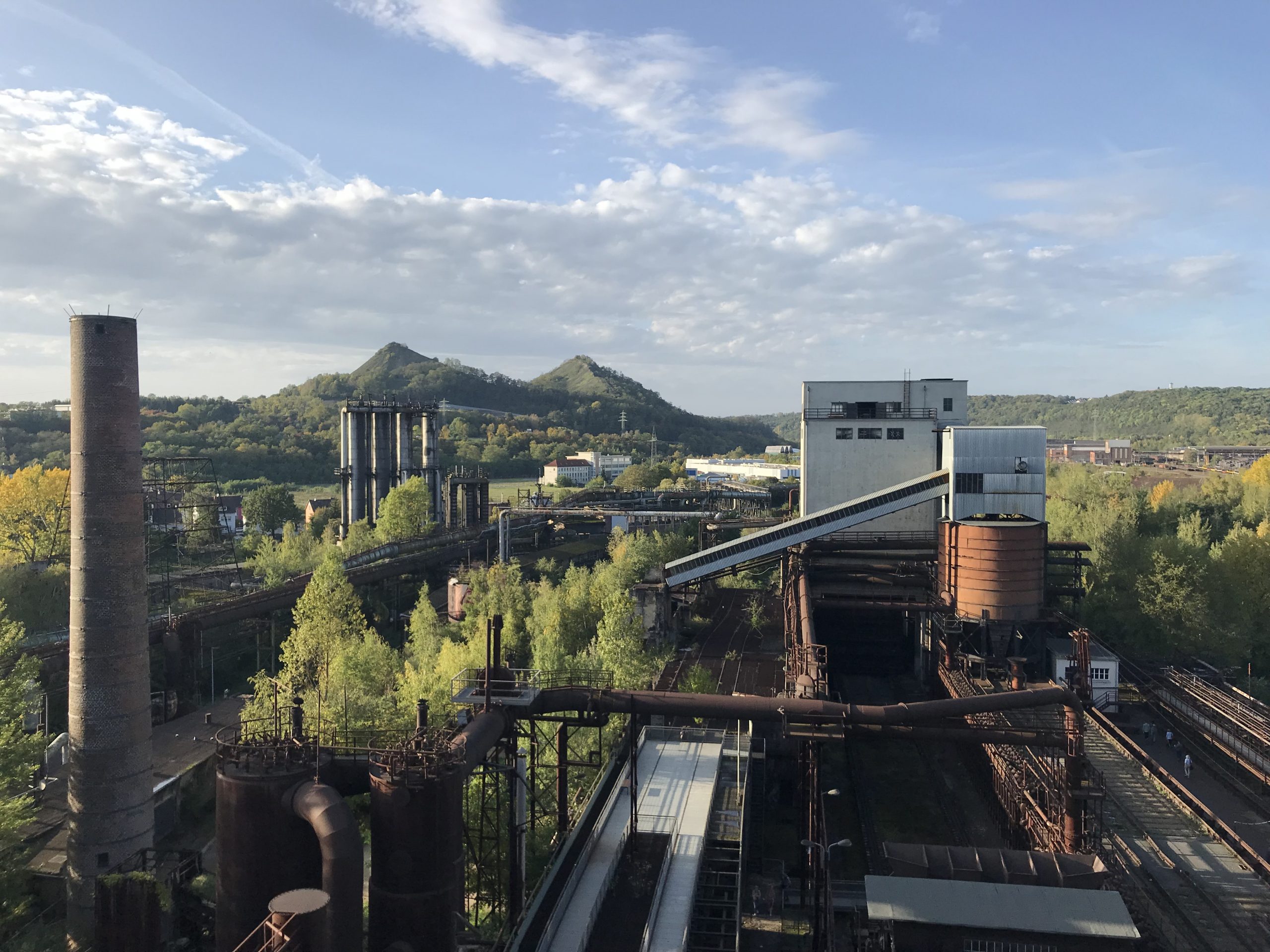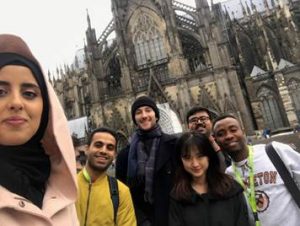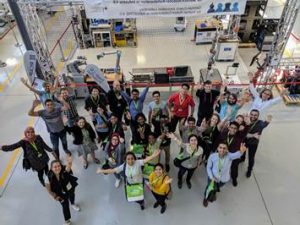Feb 18, 2020 - Paula Grote for SoGerman
In 2009, the German Federal Ministry for Education and Research (BMBF) introduced the “Green Talents – International Forum for High Potentials in Sustainable Development” in order to promote international exchange in the field of sustainability research. Each year, outstanding researchers from numerous countries receive an award for their contribution to green innovation. The awardees are then invited to Germany to get to know the German research community and experts in their field. This year, Benjamin Keenan from McGill University, Montreal, was one of the 25 scientists selected by the jury of German experts among 837 applicants from 97 countries. He studied biochemistry and is now a PhD student. SoGerman’s Paula Grote had a chance to speak to Benjamin about his research and his experiences in Germany with the other awardees.

Völklingen Ironworks, © Benjamin Keenan
Please tell me about yourself? Where are you from, what are your hobbies, where do you live?
I am from the north of England but I moved to Montréal three years ago on New Year’s Eve to do my PhD in Biogeochemistry. I like getting brioche, walking on Mont Royal, hiking, camping, and film. In the summer I love biking. My time here is flying by. My Instagram is @plainsnailing.
Had you been to Germany before the Green Talents trip? Do you have any other ties with Germany besides this award?
No, I had never been there. I hitchhiked around Europe but never made it to Germany. The closest I have been is Austria. I have a very good friend, Amelie, who is from Germany and now studying film in Berlin. I got to see her during my visit.
You won a Green Talents Award because of your outstanding contribution to “making our societies more sustainable”. What is your research about?
My research uses geochemistry to look at the response of ancient societies to climate change. A lot of people don’t know that many civilisations were affected by climate change – the Maya, the Akkadians, the Khmer empire, and others. Crop failure as a result of drought caused the Hittite Queen to write to Pharoah Ramses II telling him “I have no grain in my lands”, leading the Egyptians to mount a huge relief effort. Unlike today, this climate change was natural and might have been exacerbated by land-use change such as deforestation. I am focused on the Lowland Maya who are thought to have abandoned their major cities as a result of prolonged droughts. Using lake core records I am reconstructing the climate of the past as well as how the population changed. By making inferences about changing water supplies I hope to provide some context to the poorly understood relationship between drought and societal collapse/restructuring in the past. Lakes accumulate all sorts of bits of information over time including plant material, shells, human waste, ash and other markers of fire use, that we can collect from a lake sediment core and analyse in a lab.

How do you think the results of your research can help us solve today’s problems?
The Lowland Maya were a sophisticated society and the fact that they abandoned their cities after prolonged drought events is quite shocking. It shows just how vulnerable humans were to climate change – as they are today. By looking at the interactions between humans and climate from such a unique perspective, and in collaboration with archaeologists, I hope we can provide new insights into how tropical communities responded to and dealt with climate change in the past. This is important given that the effects of modern-day climate change are already being felt, and will be especially severe in tropical communities.
What is the impact you are hoping for? Are you in touch with decision makers in regions that face water scarcity?
I have spent a large part of my PhD project testing various methods and now I am starting to be able to share the data that I have produced. I think the greatest contribution is to the narrative of the effects that climate change can have. I have been in communication with the Programa Nacional contra la Sequía (PRONACOSE) which is the national program against drought in Mexico.
Overall, how was your trip to Germany? What did you learn, what did others learn from you?
My trip to Germany was fab. It was my first time back [in Europe] since I left home and I was excited to be back. I arrived in Saarbrucken via Frankfurt by train on a gorgeous day and then got to meet most of the other award recipients. We toured various institutions and landmarks in the west of Germany – my favourite was Völklingen Ironworks, a veritable playground – before leaving one another to visit experts in our fields. I chose mine in Berlin and Potsdam as we were reconvening there afterward. Some of the others chose to meet people on opposite ends of the country and it sounded quite stressful to have done that. This year was special in that the Ministry [of Education and Research] invited select alumni back to Germany for an alumni conference so I met a lot more people because of that, including a researcher on climate migration and refugees. We had a lot to talk about after a visit we had made to the UN in Bonn. It was cool to see such a variety of research taking place and I learned a lot about artificial intelligence. We had limited opportunity to share our research, but the 25 of us have stayed in touch and are currently writing a paper together, drawing on our variety of experiences and expertise. I feel very lucky to have spent two weeks in the company of such genuinely lovely, intelligent, and open new friends. I am excited to go back to Berlin for my three-month research stay at the end of this year.

What do you think about the worldwide attention climate change is getting right now: Does it motivate you to see young people going to the streets and to see leaders addressing the issue?
I like that climate change is receiving so much attention globally as it reflects what I believe to be a massive shift in consciousness, in the way that we interact with the world and with each other. Whilst there is obviously a sense of urgency with cutting emissions of greenhouse gases, changes have to be made in a way that reduces the impact on people’s livelihoods. I am optimistic about a Green New Deal, both in the U.S. and in Europe, although this too has its criticisms. On longer timescales, humans are very adaptable but I think mass migrations of people will take place as areas become uninhabitable as a result of rising sea levels or lack of water, and this will cause problems because of the way that borders are currently managed. With the concentration of wealth in the hands of the few, and changing climate with extreme weather events, I think the time is ripe for a restructuring of society that is much fairer for people and one that prioritises the environment – not just in terms of climate but also in biodiversity, access to healthy food and clean water as well as to green space. I am very optimistic about our future.

By looking at the interactions between humans and climate from such a unique perspective, and in collaboration with archaeologists, I hope we can provide new insights into how tropical communities responded to and dealt with climate change in the past.